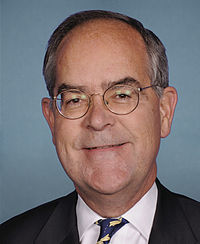
The 107th United States Congress was a meeting of the legislative branch of the United States federal government, composed of the United States Senate and the United States House of Representatives. It met in Washington, D.C. from January 3, 2001 to January 3, 2003, during the final weeks of the Clinton presidency and the first two years of the George W. Bush presidency. The apportionment of seats in this House of Representatives was based on the 1990 United States Census.

The Children's Health Insurance Program (CHIP) – formerly known as the State Children's Health Insurance Program (SCHIP) – is a program administered by the United States Department of Health and Human Services that provides matching funds to states for health insurance to families with children. The program was designed to cover uninsured children in families with incomes that are modest but too high to qualify for Medicaid. The program was passed into law as part of the Balanced Budget Act of 1997, and the statutory authority for CHIP is under title XXI of the Social Security Act.

The Equal Pay Act of 1963 is a United States labor law amending the Fair Labor Standards Act, aimed at abolishing wage disparity based on sex. It was signed into law on June 10, 1963, by John F. Kennedy as part of his New Frontier Program. In passing the bill, Congress stated that sex discrimination:

James Hayes Shofner Cooper is an American lawyer and politician who has served since 2003 as the U.S. Representative for Tennessee's 5th congressional district. He is a member of the Democratic Party and the Blue Dog Coalition, and represented Tennessee's 4th congressional district from 1983 to 1995. His district includes a large part of Nashville. He is the dean of Tennessee's congressional delegation.

Charles Wieder Dent is an American politician who served as a Republican member of the United States House of Representatives for Pennsylvania's 15th congressional district from 2005 to 2018.
In the United States, a continuing resolution is a type of appropriations legislation. An appropriations bill is a bill that appropriates money to specific federal government departments, agencies, and programs. The money provides funding for operations, personnel, equipment, and activities. Regular appropriations bills are passed annually, with the funding they provide covering one fiscal year. The fiscal year is the accounting period of the federal government, which runs from October 1 to September 30 of the following year. When Congress and the president fail to agree on and pass one or more of the regular appropriations bills, a continuing resolution can be passed instead. A continuing resolution continues the pre-existing appropriations at the same levels as the previous fiscal year for a set amount of time. Continuing resolutions typically provide funding at a rate or formula based on the previous year's funding. The funding extends until a specific date or regular appropriations bills are passed, whichever comes first. There can be some changes to some of the accounts in a continuing resolution. The continuing resolution takes the form of a joint resolution, and may provide bridging funding for existing federal programs at current, reduced, or expanded levels.

The 112th United States Congress was a meeting of the legislative branch of the United States federal government, from January 3, 2011, until January 3, 2013. It convened in Washington, D.C. on January 3, 2011, and ended on January 3, 2013, 17 days before the end of the presidential term to which Barack Obama was elected in 2008. Senators elected to regular terms in 2006 completed those terms in this Congress. This Congress included the last House of Representatives elected from congressional districts that were apportioned based on the 2000 census.
The National Defense Authorization Act (NDAA) is the name for each of a series of United States federal laws specifying the annual budget and expenditures of the U.S. Department of Defense. The first NDAA was passed in 1961. The U.S. Congress oversees the defense budget primarily through two yearly bills: the National Defense Authorization Act and defense appropriations bills. The authorization bill is the jurisdiction of the Senate Armed Services Committee and House Armed Services Committee and determines the agencies responsible for defense, establishes recommended funding levels, and sets the policies under which money will be spent. The appropriations bill provides funds.

The 113th United States Congress was a meeting of the legislative branch of the United States federal government, from January 3, 2013, to January 3, 2015, during the fifth and sixth years of Barack Obama's presidency. It was composed of the United States Senate and the United States House of Representatives based on the results of the 2012 Senate elections and the 2012 House elections. The seats in the House were apportioned based on the 2010 United States Census. It first met in Washington, D.C. on January 3, 2013, and it ended on January 3, 2015. Senators elected to regular terms in 2008 were in the last two years of those terms during this Congress.
The Saxbe fix, or salary rollback, is a mechanism by which the President of the United States, in appointing a current or former member of the United States Congress whose elected term has not yet expired, can avoid the restriction of the United States Constitution's Ineligibility Clause. That clause prohibits the President from appointing a current or former member of Congress to a civil office position that was created, or to a civil office position for which the pay or benefits were increased, during the term for which that member was elected until the term has expired. The rollback, first implemented by an Act of Congress in 1909, reverts the emoluments of the office to the amount they were when that member began his or her elected term.

The Statutory Pay-As-You-Go Act of 2010, Title I of Pub.L. 111–139 (text)(pdf), H.J.Res. 45 is a public law passed by the 111th United States Congress and signed by US President Barack Obama on February 12, 2010. The act reinstated pay-as-you-go budgeting rules used in Congress from 1990 until 2002, ensuring that most new spending is offset by spending cuts or added revenue elsewhere.

The Paycheck Fairness Act is a proposed United States labor law that would add procedural protections to the Equal Pay Act of 1963 and the Fair Labor Standards Act as part of an effort to address the gender pay gap in the United States. A Census Bureau report published in 2008 stated that women's median annual earnings were 77.5% of men's earnings. Recently this has narrowed, as by 2018, this was estimated to have decreased to women earning 80-85% of men's earnings. One study suggests that when the data is controlled for certain variables, the residual gap is around 5-7%; the same study concludes that the residual is because "hours of work in many occupations are worth more when given at particular moments and when the hours are more continuous. That is, in many occupations, earnings have a nonlinear relationship with respect to hours."

The Budget Control Act of 2011 is a federal statute enacted by the 112th United States Congress and signed into law by US President Barack Obama on August 2, 2011. The Act brought conclusion to the 2011 US debt-ceiling crisis.

The American Jobs Act and was the informal name for a pair of bills recommended by U.S. President Barack Obama in a nationally televised address to a joint session of Congress on September 8, 2011. He characterized the proposal as a collection of non-controversial measures designed to get Americans back to work, and he repeatedly urged Congress to pass it "right away"; he also said that the bills would not add to the national deficit and would be fully paid for.
Budget sequestration is a provision of United States law that causes an across-the-board reduction in certain kinds of spending included in the federal budget. Sequestration involves setting a hard cap on the amount of government spending within broadly defined categories; if Congress enacts annual appropriations legislation that exceeds these caps, an across-the-board spending cut is automatically imposed on these categories, affecting all departments and programs by an equal percentage. The amount exceeding the budget limit is held back by the Treasury and not transferred to the agencies specified in the appropriation bills. The word sequestration was derived from a legal term referring to the seizing of property by an agent of the court, to prevent destruction or harm, while any dispute over said property is resolved in court.

An act to eliminate the 2013 statutory pay adjustment for Federal employees is a bill that was introduced into and passed by the United States House of Representatives in the 113th United States Congress. It was introduced by Rep. Ron DeSantis (R-FL) on January 15, 2013 and it passed the House with a vote of 261-154 on February 15, 2013.

The No Budget, No Pay Act of 2013 is a law passed during the 113th United States Congress. The Act temporarily suspended the US debt ceiling from February 4 to May 18, 2013. It also placed temporary restrictions on Congressional salaries.

The Bipartisan Budget Act of 2013 is a federal statute concerning spending and the budget in the United States, that was signed into law by President Barack Obama on December 26, 2013. On December 10, 2013, pursuant to the provisions of the Continuing Appropriations Act, 2014 calling for a joint budget conference to work on possible compromises, Representative Paul Ryan and Senator Patty Murray announced a compromise that they had agreed to after extended discussions between them. The law raises the sequestration caps for fiscal years 2014 and 2015, in return for extending the imposition of the caps into 2022 and 2023, and miscellaneous savings elsewhere in the budget. Overall, the bill is projected to lower the deficit by $23 billion over the long term.

The Continuing Appropriations Resolution, 2015 is a continuing resolution and United States public law that funded the federal government of the United States through December 11, 2014 by appropriating $1 trillion.
The Holman Rule is a rule in the United States House of Representatives that allows amendments to appropriations legislation that would reduce the salary of or fire specific federal employees, or cut a specific program. The rule was first enacted in 1876 and rescinded in 1983, and was reinstated in January 2017 on a temporary basis. It was in effect for the entirety of the Republican-controlled 115th Congress and several amendments were proposed that progressed to a vote of the full House, but none were adopted. The rule was rescinded once more at the beginning of the 116th Congress upon Democrats taking control of the chamber.








